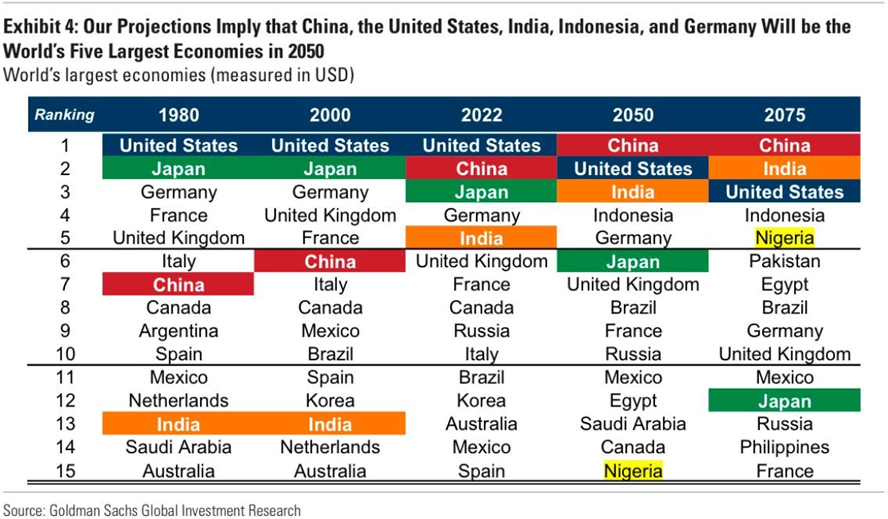Nigeria’s current administration is embarking on a transformative journey, aiming to propel the real GDP to $1 trillion by 2030.
However, the nation stands at a pivotal juncture, with projections from various economic forecasts indicating the potential for Nigeria to join the ranks of global top economies by mid-century and beyond.
Nevertheless, the path to achieving such ambitious goals is beset by numerous challenges, with the harnessing of data and transformative technologies such as artificial intelligence (AI) emerging as a critical imperative.
The essence of AI lies in data, data management, data science, data engineering, model development, constraints considerations, outcomes and value add.
Data has become a cornerstone of developed economies, serving as a key infrastructure for progress and advancement.
Two research reports the Goldman Sachs Research report 2022 titled “The path to 2075: Slower global growth, but convergence remains intact” and PwC’s “Sizing the Prize: Exploiting the AI Revolution” provide invaluable insights into the global economic landscape and the multifaceted role of AI. These reports offer both a roadmap for Nigeria’s economic trajectory and a cautionary narrative, guiding the nation’s decision-making processes.
Nigeria can draw valuable lessons and guidance from these reports as it charts its course toward becoming a leading global economy.
For instance, the UK Government recently unveiled the AI Opportunities Action Plan, positioning AI at the core of public services. This initiative has garnered support from leading technology firms, which have pledged £14 billion towards various projects and the creation of 13,250 jobs within the country.
Furthermore, the Government of France announced a substantial investment of €109 billion over the coming years, with the primary focus on constructing infrastructures such as computing clusters and data centres across the nation.
Following his inauguration, President Donald Trump celebrated the launch of a $500 billion AI infrastructure project called Stargate, which is spearheaded by SoftBank and OpenAI. Notably, Google, Amazon, Meta, and Microsoft have collectively announced approximately $300 billion in AI-related capital expenditures for the current year.
In China, the AI revolution is unfolding through the development of advanced technologies, such as DeepSeek, a Chinese company that is making significant strides in the affordable development of AI that can rival OpenAI, Google, and other leading companies.
The Promise and Potential of AI
PwC’s Global Artificial Intelligence Study presents a positive outlook: AI is projected to contribute up to $15.7 trillion to the global economy by 2030.
This transformative potential transcends high-income economies, serving as a potent catalyst for productivity enhancements, innovation, and competitive advantage across all sectors, including agriculture, manufacturing, services, and trade.
In Nigeria, a nation blessed with a growing youthful population, abundant natural resources, a burgeoning entrepreneurial spirit, and access to data and artificial intelligence (AI), the potential for enhanced efficiency and growth across various technological sectors is enormous.
These sectors include agricTech, bioTech, cleanTech, edTech, energyTech, finTech, regTech, foodTech, healthTech, greenTech, insurTech, propTech, retailTech, and travelTech.
For instance, in the agricultural sector, which employs a substantial portion of the Nigerian workforce, data-driven and AI-enabled technologies can optimise seed planting and cultivation cycles, predict weather patterns, and streamline supply chains and logistics.
Similarly, in the manufacturing and services sectors, automation, risk management, data integration, insights, and intelligence can significantly enhance productivity and quality control, paving the way for domestic and export-oriented industries.
The Global Context: Slower Growth and Convergence
The Goldman Sachs Research report, entitled “The path to 2075: Slower global growth, but convergence remains intact,” highlights a pivotal global dynamic: while overall growth may experience a slowdown, the convergence between advanced economies and emerging markets will persist.
This convergence presents Nigeria with an opportunity to catch up if it capitalises on the opportunities presented by data and technology.
However, this pursuit is not solely driven by natural economic progression; it necessitates proactive and pragmatic policy decisions, as well as the strategic adoption of cutting-edge technologies such as artificial intelligence (AI) and data management practices.

The Role of Data and AI in Nigeria’s Economic Development
Data and AI have the potential to transform various sectors of Nigeria’s economy, propelling the country forward.
Modernising Key Sectors: By harnessing the power of data and integrating AI into sectors such as agriculture, security, energy, manufacturing, and services, Nigeria can enhance productivity, reduce costs, and improve product quality. This will enhance its competitiveness on the global stage and enable it to gain a comparative advantage in the export market.
Enhancing Public Services and Governance: Data and AI applications in public administration can streamline government operations, improve service delivery, foster greater transparency and reduce corruption. From delivering public services at both the national and sub-national levels to securing critical infrastructures and resources, supply chain management, and public transport, data and AI can contribute to the improvement of the quality of life for millions of Nigerians. This, in turn, will create a more conducive environment for economic growth.
Fostering Innovation and Entrepreneurship: Data and AI can foster innovation and entrepreneurship by providing a platform for businesses to develop new products and services. They can also enable entrepreneurs to access data and analytics to make informed decisions and improve their competitiveness.
A robust data and AI ecosystem can stimulate the growth of tech startups, innovation and attract foreign direct investment. By creating innovation and growth hubs and investing in research and development, Nigeria can nurture a new generation of entrepreneurs who are adept at leveraging technology to solve local problems first with global impact.
Building a Future-Ready Workforce: Investment in education and training is crucial. By prioritising STEAM (science, technology, engineering, arts and mathematics) education and upskilling its workforce in data and
AI-related fields, Nigeria can prepare its population for the jobs of the future—ensuring that technological adoption leads to inclusive growth rather than widening inequality.
The Risks of Inaction
While the potential benefits are significant, the challenges and risks associated with data and AI adoption cannot be ignored:
Digital Infrastructure and Investment Gaps: Nigeria must overcome considerable deficits in digital infrastructure. Without substantial investments in reliable internet connectivity, power supply, data centres, supercomputers, growth zones and workable tech hubs and infrastructures, the nation’s ability to implement data and AI-driven solutions will be severely hampered.
Skills Shortage and Educational Challenges: Even if the necessary technology is available, a shortage of skilled professionals could slow the adoption of data and AI. Nigeria faces the dual challenge of reforming its education system, and curriculums and providing extensive vocational training to build a workforce capable of innovating with data and driving and maintaining AI systems.
Regulatory and Ethical Concerns: The rapid deployment of data and AI brings with it issues related to privacy, data security, and ethical use. Nigeria will need to develop robust regulatory frameworks beyond the data protection legislation that balances innovation with safeguards to protect citizens and prevent misuse of data and technology across the country.
Potential for Increased Inequality: Without inclusive policies both at the national and sub-national level, data and AI could exacerbate existing inequalities. Regions and sectors that can afford to invest in data and AI might pull further ahead, leaving behind marginalised communities and deepening the digital divide even across the urban and rural areas in the country.
The Implications of Missing the Data and AI Opportunity
Should Nigeria fail to fully adopt and embrace data and AI, the implications could be severe. The nation risks missing out on critical productivity gains and competitive advantages, potentially relegating it to a position where it struggles to keep pace with global economic trends.
In a world where data and AI are key drivers of innovation and efficiency, inaction could mean:
Stunted Economic Growth: Without data and AI-driven improvements in efficiency and productivity, Nigeria’s economic growth may slow, jeopardising its ability to climb the global economic rankings.
Reduced Global Competitiveness: Nations that successfully use data and integrate AI into their economies will be better positioned to attract foreign investment and innovate on a global scale. Nigeria could find itself at a competitive disadvantage, with industries that lag in productivity technological sophistication and capacity.
Missed Opportunities for Social Development: Beyond economic metrics, the social benefits of data and AI—improved healthcare, education, and public services—could remain unrealized, further entrenching socio-economic disparities.
What you should know
Nigeria’s aspiration to join the ranks of the world’s leading economies is within reach, but the journey requires focus and a bold, pragmatic and forward-looking approach.
During the AI Action Summit in Paris, US Vice President JD Vance admonished the audience in the room that ‘focus matters’, and the need to focus now on AI opportunities, unleash the most brilliant innovators, and use AI to improve the well-being of nations and people. He went further, the AI opportunity is a great one which the Trump administration won’t squander.
This is the focus and attitude Nigeria must have especially at this crossroads. This is beyond strategy – it is about getting to work with a clear vision, mission and roadmap in collaboration with the private sector, higher institutions, third sector, trade bodies, and international partners – with practical and robust plan, action and implementation – solving the critical problems within the shortest possible time in the country and creating opportunities.
Data and AI stand out as critical enablers of this transformation, capable of driving efficiency, fostering innovation, and leveling the playing field in a globally converging economy. However, embracing this technology is not without its challenges.
The country must invest heavily in digital infrastructure, education, skills and training, and regulatory frameworks to harness the full potential of data and AI.
In summary, if Nigeria can effectively integrate data and AI into its economic fabric, it could not only achieve its projected economic milestones but also set a precedent for emerging economies worldwide.
Conversely, failure to do so may result in missed opportunities, slower growth, resource wastage and a widening gap between Nigeria and the more technologically advanced nations of the world.
The path forward is clear: a strategic, pragmatic, inclusive, well-thought approach to data and AI, is not just an option—it is an imperative for Nigeria’s future prosperity.
This article is written by Abel Aboh (recognised Data and AI Leader passionate about data, AI, innovation, technology, trade, finance, education, and social mobility) follow on X: @abel_DMChampion










